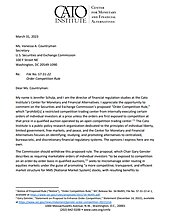Dear Ms. Countryman:
My name is Jennifer Schulp, and I am the director of financial regulation studies at the Cato Institute’s Center for Monetary and Financial Alternatives. I appreciate the opportunity to comment on the Securities and Exchange Commission’s proposed “Order Competition Rule,” which “prohibit[s] a restricted competition trading center from internally executing certain orders of individual investors at a price unless the orders are first exposed to competition at that price in a qualified auction operated by an open competition trading center.” The Cato Institute is a public policy research organization dedicated to the principles of individual liberty, limited government, free markets, and peace, and the Center for Monetary and Financial Alternatives focuses on identifying, studying, and promoting alternatives to centralized, bureaucratic, and discretionary financial regulatory systems. The opinions I express here are my own.
The Commission should withdraw this proposed rule. The proposal, which Chair Gary Gensler describes as requiring marketable orders of individual investors “to be exposed to competition on an order-by-order basis in qualified auctions,” seeks to micromanage order routing in equities markets under the guise of promoting “a more competitive, transparent, and efficient market structure for NMS [National Market System] stocks, with resulting benefits to investors.” By micromanaging order routing, however, this proposed rule is, itself, anticompetitive and may harm, rather than benefit, retail investors.
Section 11A of the Securities Exchange Act sets forth objectives for the Commission to facilitate a National Market System, including the “economically efficient execution of securities transactions,” and “fair competition among brokers and dealers, among exchange markets, and between exchange markets and markets other than exchange markets.” The statute, however, does not define what is meant by efficiency or competition.
Contrary to this proposal’s suggestion that competition requires order-by-order competition, competition often occurs in our securities markets at the level of the trading venue. This proposal, however, treats such competition as disfavored, and somewhat confusingly downplays the dynamic nature of venue-level competition at the same time the Commission proposes rule changes, such as its Best Execution rule proposal, aimed at fine-tuning broker obligations under such competition.

